During Game 1 of the playoff series between the Carolina Hurricanes and the New York Rangers, defenseman Tony DeAngelo experienced a barrage of vulgar chants from Rangers fans. These chants intensified when DeAngelo’s penalty led to a crucial power-play goal for the Rangers. The Rangers capitalized on their power play opportunities, scoring two goals in a span of 23 seconds during the first period. This quick offense put the Hurricanes on the back foot and showcased the effectiveness of the Rangers’ power play unit.
One of the pivotal moments of the game came when DeAngelo was penalized for a roughing hit that was initially mistaken for a tripping offense by Carolina forward Martin Necas. The confusion surrounding the call created a tense atmosphere on the ice and left both teams and fans questioning the referees’ decision-making. While DeAngelo downplayed the impact of the chants and calls, Carolina coach Rod Brind’Amour expressed dissatisfaction with the officiating and the lack of clear explanations provided.
Penalties at critical junctures disrupted the Hurricanes’ rhythm and effectiveness throughout Game 1. Captain Jordan Staal acknowledged that the emotional environment at Madison Square Garden contributed to their early penalties and emphasized the need for the team to remain composed moving forward. Despite Brind’Amour’s defense of his players’ actions, there was a consensus that avoiding unnecessary penalties would be crucial in determining the outcome of the series.
Looking ahead to Game 2, both teams anticipate a raucous crowd at MSG and acknowledge the potential impact of fan energy on player performances. DeAngelo rejected the notion that the hostile atmosphere could lead to undisciplined play from Carolina, citing the intensity of playoff hockey as a counterpoint. However, the history and reputation of New York sports fans as passionate supporters could not be overlooked, setting the stage for another high-stakes and emotionally charged matchup.
The interactions between fan behavior, officiating decisions, and player responses create a complex web of influences that shape the dynamics of playoff hockey. While players like DeAngelo may dismiss fan chants and external pressures, the reality is that the environment in which games are played can have a significant impact on outcomes and momentum shifts. As the series progresses, both teams will need to find a balance between harnessing the energy of the crowd and maintaining focus on their game strategies to secure victories and advance in the playoffs.


Leave a Reply